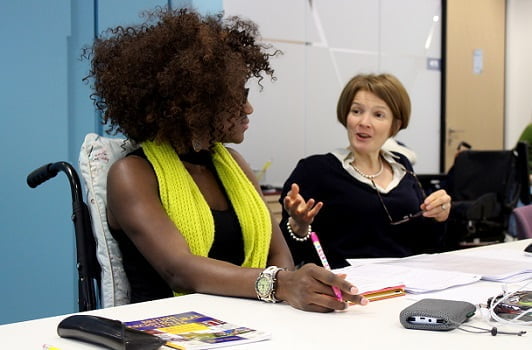Stef Cormack: Work is good for you
5 October 2016

At Back Up we’re here to support people to get the most out of life. And for most people, work is an important part of our lives, our identity and our daily routine. Beyond the obvious benefits of increased financial independence and autonomy, decent work (whether paid or not) brings a sense of purpose, a social network, stimulation and is proven to bring enormous health benefits, both physical and psychological.
We support people to overcome the barriers to working, through our Back Up To Work service. This includes a residential course run 3 times a year that gives participants vital skills for securing work and the opportunity to discuss any concerns surrounding disability in the workplace, as well as ongoing one-to-one support and opportunities for work placements, mentoring and coaching. But we are disappointed that nationally, only around a third of people with spinal cord injury are in work. Too many people are coming out of rehabilitation believing that their spinal cord injury prevents them from working. They struggle to envision a future where they’re employed because they don’t know about the support available to help them make that transition.
So we decided that as well as supporting people to solve their own work issues, we should also work to help prevent some of those problems in the first place. We can do this by using our expertise to support and influence the way rehabilitation is delivered. If we get it right then someone who’s newly injured will get a chance to learn what’s possible for them, and be linked at the earliest opportunity into ongoing support to help them achieve it; even if they’re not necessarily ready to get there right at the start.
I’m a committee member of the Multidisciplinary Association of Spinal Cord Injury Professionals and was recently asked to chair the development of national guidelines on vocational rehabilitation for people with a spinal cord injury. This was an opportunity to help guide staff in spinal cord injury rehabilitation as to how best to plan and deliver their service. I was so grateful for the chance to bring together experts to agree a consensus on best practice in helping people get back to work. We have a very wide range of people across the UK and Ireland who are helping to contribute to and shape the guidelines. We are part-way through the process, aiming to launch in 2017, but it is heartening to hear that we’re already having a positive impact on spinal cord injury centres, allowing them to be ever more effective in their vital work.
Victoria Wagstaff Occupational Therapist at Pinderfields spinal centre is one of the people involved in this project:
“The guidelines development has already been helpful to us in our thinking about the vocational support we provide. We are now trying to engage people earlier to have a discussion about employment and think through their work plans.
”It has already proved helpful in enabling people to realise that fulfilling work is still possible for them, or exploring other options that they may not, previously, have considered.”
In our Back Up to Work survey last year, a third of people told us they did not receive any support in returning to work after their injury. I hope that MASCIP’s new guidelines will support collaborative efforts of colleagues across the sector and start to change this trend, ensuring that all newly spinal cord injured people receive the support they need to start their journey back into employment.
For more information about the new guidelines for vocational rehabilitation, contact Stef (Stef@backuptrust.org.uk).

